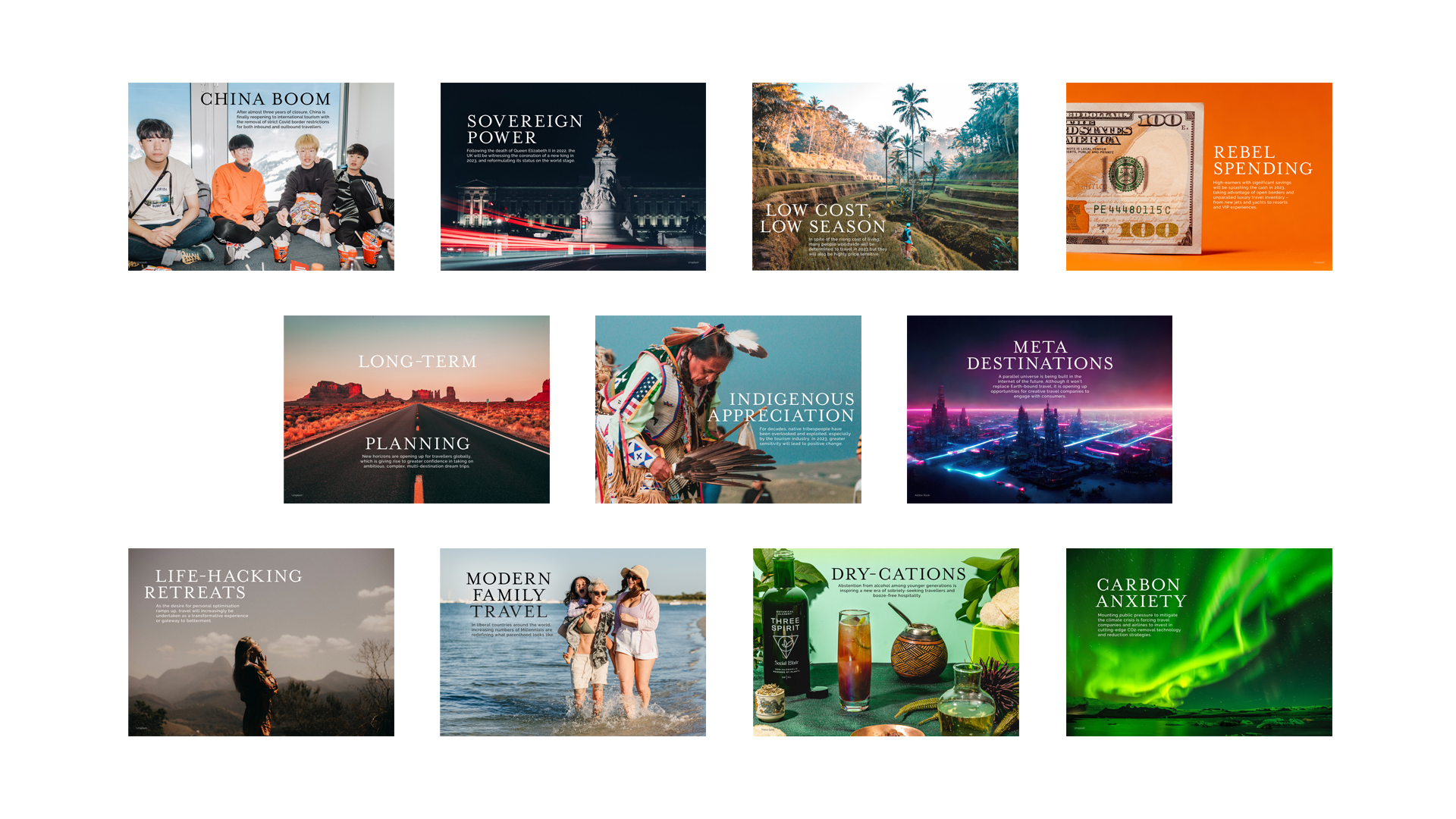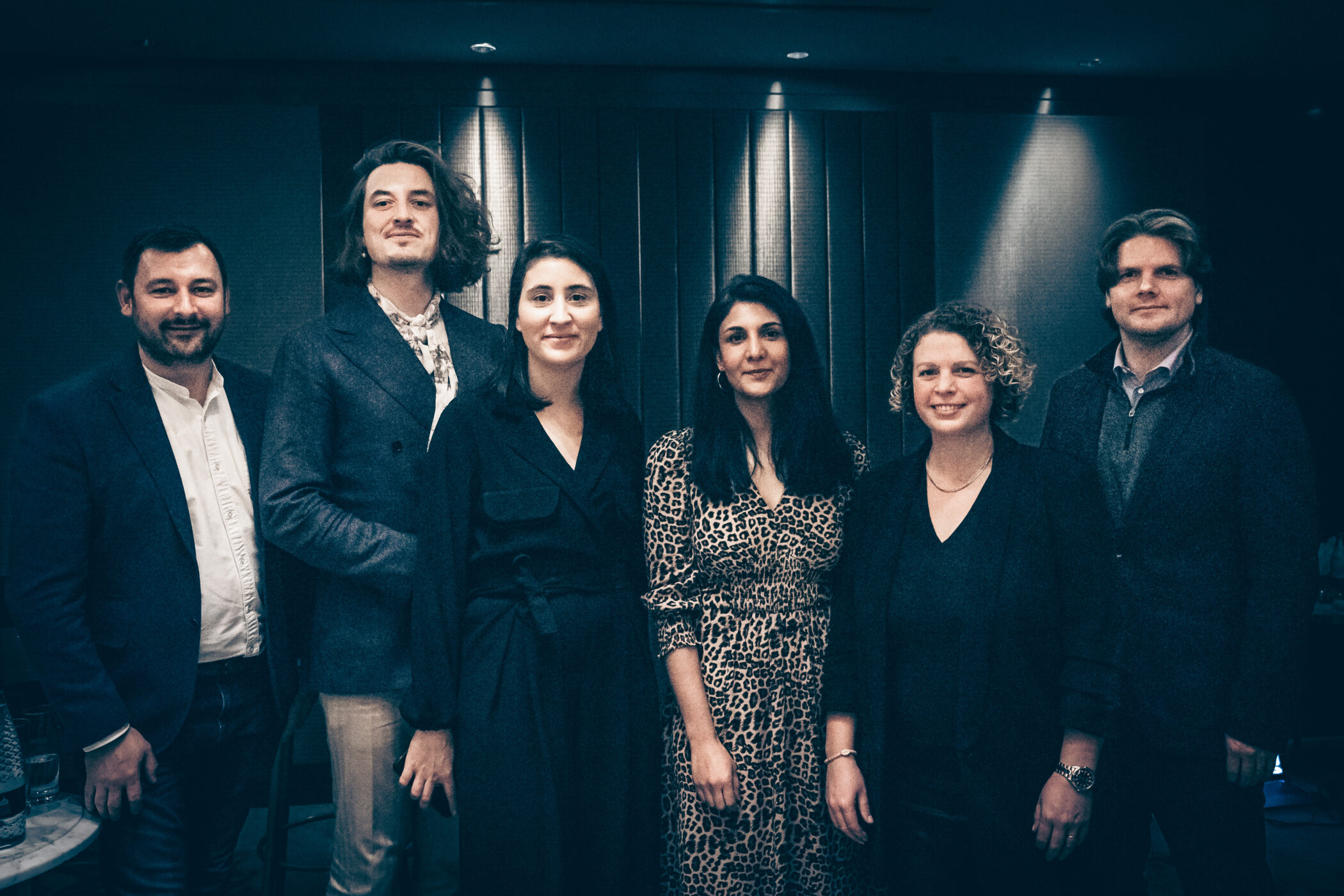China Boom, Rebel Spending, Dry-Cations and Indigenous Appreciation are among the trends revealed in Globetrender’s new 2023 Travel Trend Forecast.
An increase in Millennial LGBTQ+ parents is also giving rise to Modern Family Travel, and consumer confidence is triggering Long-Term Planning.
The forecast, which has been sponsored by HotelPlanner, highlights 11 key trends – that have been identified and coined by Globetrender – for travel in 2023.
These are: “China Boom”, “Sovereign Power”, “Low Cost, Low Season”, “Rebel Spending”, “Long-Term Planning”, “Indigenous Appreciation”, “Meta Destinations”, “Life-Hacking Retreats”, “Modern Family Travel”, “Dry-Cations” and “Carbon Anxiety”.  The trends were revealed at an event on January 9 at the Shangri-La the Shard hotel in London, which was attended by both press and senior figures from the luxury travel industry, as well as a panel of expert speakers.
The trends were revealed at an event on January 9 at the Shangri-La the Shard hotel in London, which was attended by both press and senior figures from the luxury travel industry, as well as a panel of expert speakers.
The speakers were: Tim Hentschel, CEO of HotelPlanner; Zina Bencheikh, managing director EMEA of Intrepid Travel; Andy Washington, general manager EMEA for Trip.com; Radha Vyas, co-founder and CEO of Flash Pack; and freelance journalist Damien Gabét.  Jenny Southan, editor, founder and CEO of Globetrender, says: “Our number-one trend for the year ahead is ‘China Boom’. After three years of closure during the pandemic, the country is finally dropping its ‘zero Covid’ restrictions and opening its borders to international travel.
Jenny Southan, editor, founder and CEO of Globetrender, says: “Our number-one trend for the year ahead is ‘China Boom’. After three years of closure during the pandemic, the country is finally dropping its ‘zero Covid’ restrictions and opening its borders to international travel.
“This promises to be very positive for the global tourism economy – in 2019, spending from Chinese travellers amounted to US$255 billion – more than any other nation. (In second place was spending from the US, which totalled US$132 billion.) At the moment, a number of countries are imposing Anti-Viral Arrival protocols on Chinese travellers but we hope this will be short-lived.” She continues: “In spite of the fact that a third of countries around the world will be in recession in 2023, or will be experiencing economic conditions that feel like recession (according to the International Monetary Fund), average earners will be doing everything they can to get at least one holiday in the year ahead. Travel is something few people want to sacrifice anymore. Among high-earners, there will be defiant spending on lavish hotels, eye-popping experiences and round-the-world adventures.”
She continues: “In spite of the fact that a third of countries around the world will be in recession in 2023, or will be experiencing economic conditions that feel like recession (according to the International Monetary Fund), average earners will be doing everything they can to get at least one holiday in the year ahead. Travel is something few people want to sacrifice anymore. Among high-earners, there will be defiant spending on lavish hotels, eye-popping experiences and round-the-world adventures.”
Southan also highlights how the concept of the “nuclear family” is becoming outmoded, and that hospitality providers need to become more fluent in catering to 21st-century “Modern Family Travel”. (According to the Office for National Statistics, in 2019 there were 212,000 same-sex families in the UK, an increase of 40% since 2015. In 2021, one in six adoptions in the UK were made by same-sex couples, compared to one in 22 in 2011.)

Tim Hentschel, CEO of HotelPlanner – a hotel deals booking service specialising in negotiated group hotel rates, says: “We’re honoured to sponsor Globetrender’s latest thought leadership on the rapidly evolving travel and tourism landscape. As we enter a new ‘golden age’ of travel, our industry will become increasingly reliant on predictive analytics and actionable business intelligence to meet the diverse needs of travellers. Globetrender’s insights add tremendous value to our industry’s knowledge base.
“2023 will be the year of the Asia-Pacific comeback, as China comes out of lockdown and allows unfettered travel. At HotelPlanner we are forecasting about an 8 per cent average increase in hotel occupancy globally this year, largely due to China relaxing travel restrictions, coupled with the on-going return of group and corporate travel.” Kurt Macher, general manager of the Shangri-La the Shard, London, says: “Diversity and inclusion is an area I hope to see grow in the hospitality industry this year. At Shangri-La the Shard, London, we’re an LGBTQ+ friendly hotel and have made efforts to ensure that all of our guests feel welcomed and included, whether that means using correct pronouns on welcome letters or providing slippers and bathrobes that are inclusive and respectful of all genders.
Kurt Macher, general manager of the Shangri-La the Shard, London, says: “Diversity and inclusion is an area I hope to see grow in the hospitality industry this year. At Shangri-La the Shard, London, we’re an LGBTQ+ friendly hotel and have made efforts to ensure that all of our guests feel welcomed and included, whether that means using correct pronouns on welcome letters or providing slippers and bathrobes that are inclusive and respectful of all genders.
“We even welcomed our first ‘throuple’ this year, showing that the average traveller is not always a traditional heterosexual couple and that hotels need to adapt and be ready to make all guests feel truly welcome and included.”
Zina Bencheikh, managing director EMEA of Intrepid Travel, says: “Indigenous tourism is one of the fastest-growing trends in travel and I’m expecting it to be big for 2023. Post pandemic, people are looking for genuinely sustainable and community-led experiences that benefit both the land and its people.
“As well as generating income and empowering local communities, these kinds of experiences give travellers an amazing insight into traditional ways of life and a better understanding of a destination’s diverse legacy. At Intrepid Travel we have put a major focus on developing more Indigenous tourism experiences, especially in the United States and Canada, and in Australia, for 2023.”
Andy Washington, general manager EMEA for Trip.com, says: “Travel is continuing to rebound from the effects of the pandemic with Trip.com Group recording a net revenue in Q3 2022 of US$969 million – a year-on-year increase of 29%. We are looking at longer booking windows and the return of short-haul city breaks. Customers also appear to be booking fewer trips, however, the length of those trips has been growing and, in turn, spend.
“Increased demand for overseas travel, coupled with more flexible work schedules in remote working environments, appears to be producing a trend towards year-round demand to many destinations. This means destinations that were traditionally more popular in the summer months or school holidays are effectively losing their shoulder and down seasons. Transatlantic travel has also taken off and beach breaks remain popular.”
Radha Vyas, co-founder and CEO of Flash Pack, says: “Millennials will be travelling less but travelling smarter. With growing concerns around climate change and the impact of flying, slower, more immersive travel is having its moment. We expect 2023 to be the year where people will start to travel more infrequently, but for longer periods of time.
“We don’t have plans to launch in China until 2024. However, our trips in the Far East have been booming – especially to Japan where all six dates to see the cherry blossom in April have nearly all sold out. Despite the civil unrest that has rocked Sri Lanka for the last year, it is now experiencing a comeback and has positioned itself as one of our top ten selling trips for 2022 – and we do not expect interest to slow down any time soon.”
Freelance journalist Damien Gabét, says: “Catch-up or ‘revenge’ travel is still a thing, but the cost of going away has skyrocketed. Low-season travel is looking more and more attractive. And with the uncommonly warm winter we’re experiencing in Europe, folks can still have a day at the beach in January. The Algarve hit 23ºC on December 27th!
“Lower prices are a major draw for remote workers – or digital nomads – like me, too. Why stay in drizzly, cost-of-living Brexitannia? You can do 90 days in Europe without a visa and if you want to stay longer, new digital nomad visas are making it all relatively straightforward. I now go to Lebanon every winter. Cheap, warm and welcoming. Portugal is popular, but it’s already getting expensive. My hot tip for 2023 is Athens.”

